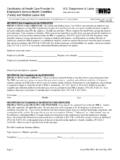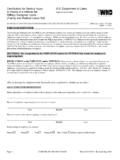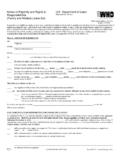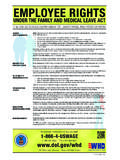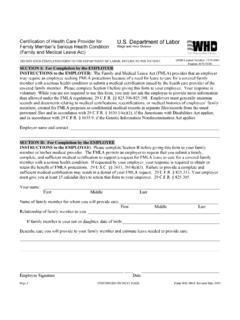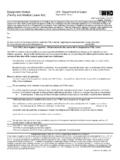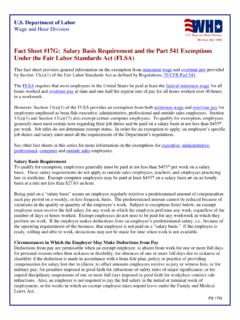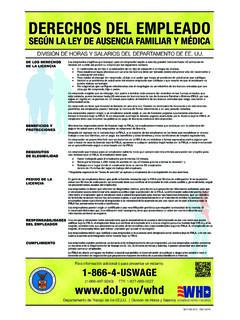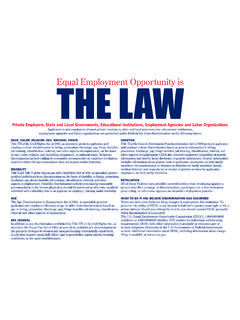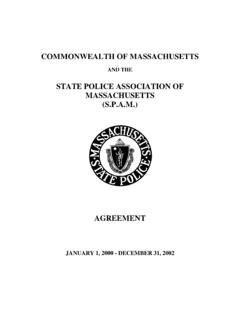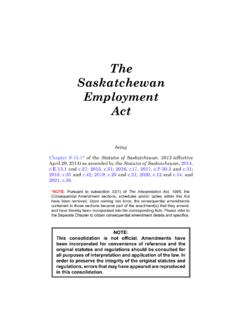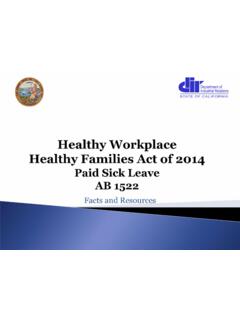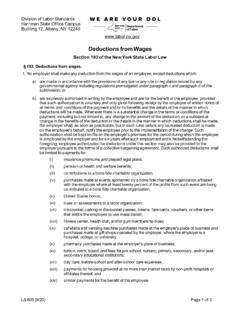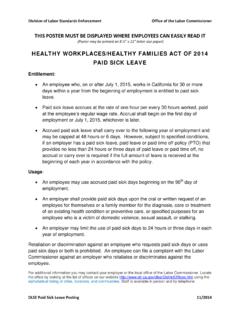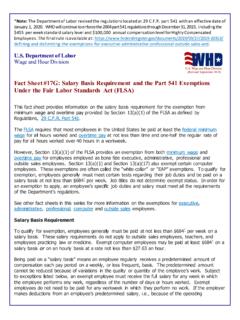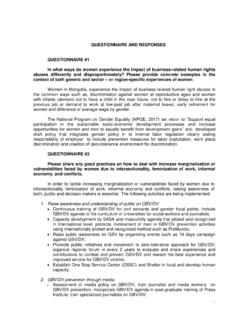Transcription of Why the Minimum Wage Deserves your Maximum Attention
1 Department of Labor wage and Hour Division Why the Minimum wage Deserves your Maximum Attention Violations found among employers nationwide When you create your business plan, forecast your expenses, and balance your budget, staffing costs play a pivotal role. Determining hourly rates to pay your employees causes you to take many factors into consideration. How much should you pay your entry level employees? How much should you pay your managers? Minimum wage requirements under the Fair Labor Standards Act (FLSA) are a key component in that formula. Minimum hourly rates, as well as the circumstances under which you are allowed to make deductions from employees pay for items like uniforms, cash shortages, etc., not only steer your business decisions but are also clearly established by the requirements of the FLSA.
2 The Department of Labor, wage and Hour Division enforces the FLSA, the federal law that provides Minimum wage , overtime, child labor, and recordkeeping requirements for covered employers in the Determining and paying the Minimum compensation due to your employees under that law depends upon paying at least the legally-required Minimum wage for all hours worked. Unless a specific exemption applies, employees must be paid at least the Minimum wage for each hour worked, and time-and-one-half their regular rates for any hours in excess of 40 hours worked in a workweek. Employees who do not qualify for an exemption are commonly referred to as non-exempt employees, while those who do qualify are referred to as exempt employees. The federal Minimum wage for covered, non-exempt employees is currently $ per hour, which has been effective since July 24, 2009.
3 Some of the most frequent problem areas identified in businesses that lead to violations of the Minimum wage requirements include: 1) Paying hourly rates below $ per hour; 2) Making deductions from employees pay for uniforms; 3) Making deductions from employees pay for cash register shortages; 4) Making deductions from employees pay to cover damages to equipment, customers who walked out on their bills, or other property losses to the employer; and 5) Failing to pay for hours worked. FLSA violations result when all hours worked are not paid for and overall wages fall below $ per hour. Minimum wage Principles: The federal Minimum wage provisions are contained in the FLSA. The federal Minimum wage is $ per hour, effective July 24, 2009. Many states also have their own Minimum wage laws, some of which provide greater employee protections. In cases where an employer is subject to both a federal and a state law at the same time, the employer must comply with the higher standard in order to be in compliance with both.
4 For example, the federal Minimum wage is $ per hour. If the Minimum wage in your state is $ per hour, you must pay your employees $ per hour in order to be in compliance with both the federal and the state requirements. Generally speaking, when you re subject to two laws at the same time, the stricter standard applies. Posters: Every employer of employees subject to the FLSA s Minimum wage provisions must post, and keep posted, a notice explaining the law in a conspicuous place in all of their establishments ( , in a place where employees can readily read it). WHD prescribes the content of this notice. An approved copy of the poster may be downloaded free of charge at the following link: Questions about the Minimum wage often arise in the following situations: 1) What is the lowest amount I can legally pay my employees per hour? The current federal Minimum wage is $ per hour.
5 $ per hour is the lowest amount you can pay a non-exempt employee. Even if an employee agrees to work for less, such an agreement would not make payment below that amount legal. However, certain specific programs do allow wage payments to certain employees in amounts less than $ per hour, but only when specific conditions are met. Examples include student learners (vocational education students), and workers whose earning or productive capacities for the work to be performed are impaired by physical or mental disabilities. (See for more information on these programs). 2) Can I charge my employees for uniforms? Yes, under certain conditions. The FLSA does not require that employees wear uniforms. However, if the wearing of a uniform is required by some other law, the nature of a business or by an employer, the cost and maintenance of the uniform is considered to be a business expense of the employer.
6 If the employer requires the employee to bear the cost, that cost may not reduce the employee's wage below the Minimum wage of $ per hour. Nor may that cost cut into overtime compensation required by the Act. If an employee who is subject to the Minimum wage of $ per hour is paid only the Minimum amount of $ per hour, the employer may not make any deduction from the employee's wages for the cost of the uniform, nor may the employer require the employee to purchase the uniform on his/her own. If an employer only requires a general type of ordinary basic street clothing to be worn while working and permits some variation (For example, the employer requires only khaki pants and a green polo-style shirt), such clothing would not be considered a uniform. The cost to the employee of buying these items, which could be worn for personal use outside of work, does not have to be considered by the employer.
7 Some states impose their own requirements with regard to permissible deductions. In areas of mutual jurisdiction, the higher standard applies. 3) If the cash register comes up short at the end of a shift, can I require the employees responsible for the cash drawer to pay back the shortage? No deduction may be made from an employee s wages which would reduce the employee s earnings below the required Minimum wage or overtime compensation. In addition to cash drawer shortages, employers sometimes consider making deductions for damages to their property caused by an employee, financial losses due to customers not paying their bills, and/or theft of the employer s property by the employee or others. Employees may not be required to pay for any of these items if, by doing so, their wages would be reduced below the required Minimum wage or overtime compensation.
8 This is true even if an economic loss suffered by the employer is due to the employee s negligence. Employers may not avoid FLSA Minimum wage and overtime requirements by having the employee reimburse the employer in cash for the cost of such items in lieu of deducting the cost directly from the employee s wages. 4) How often does the federal Minimum wage increase? The Minimum wage does not increase automatically. Congress must pass a bill which the President signs into law in order for the Minimum wage to go up. However, there is nothing in the law that prevents employers from paying more than the Minimum wage . For additional information on the requirements of the FLSA, visit the U. S. Department of Labor wage and Hour Division s website at , or call 866-4US- wage (866-487-9243). Your state may have additional or different statutes or regulations.
9 To find your state labor department s contact information, visit.
